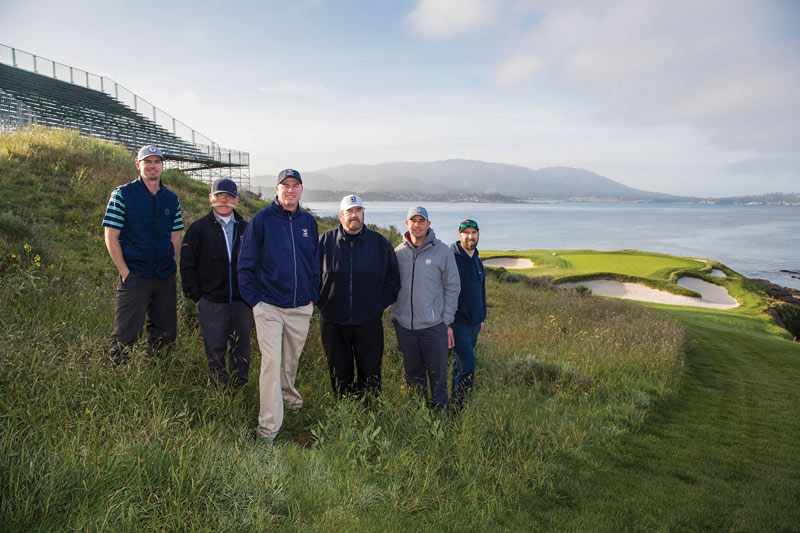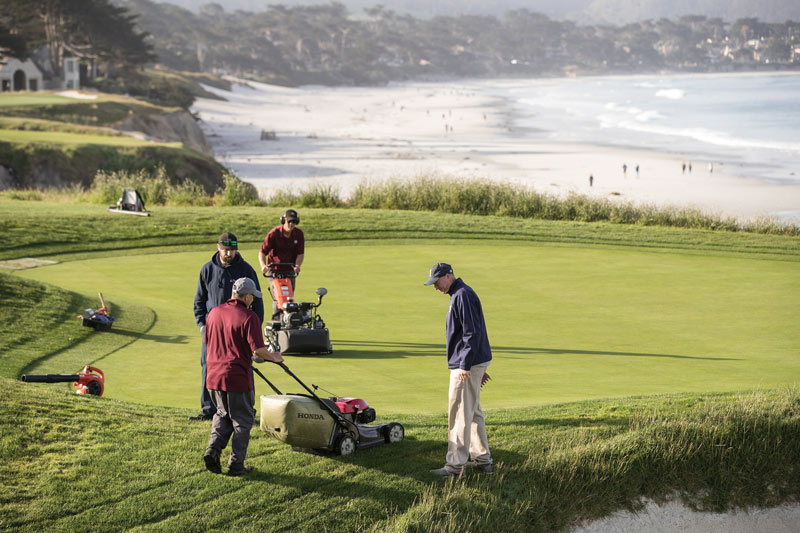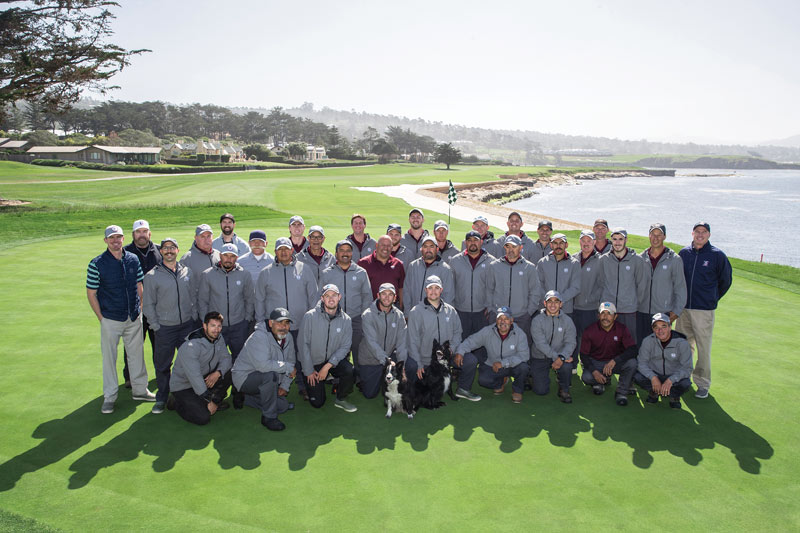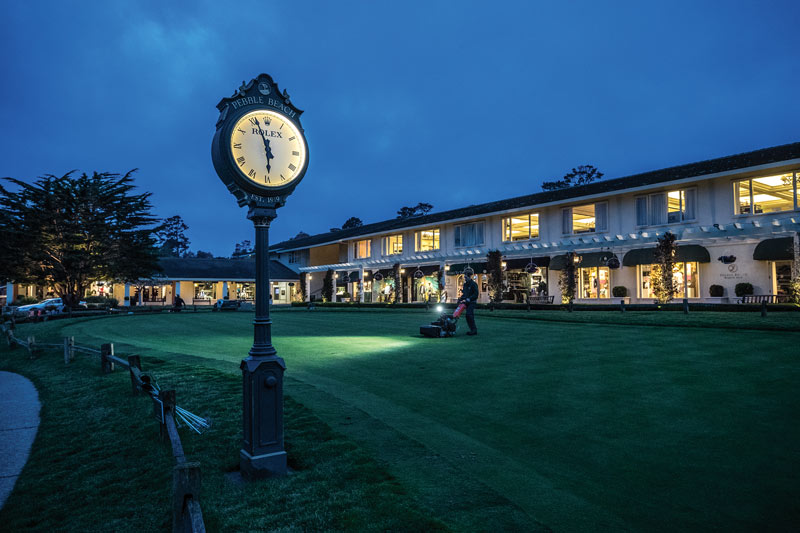

The senior leadership team in the golf course maintenance department at Pebble Beach (Calif.) Golf Links, host to this month’s U.S. Open (from left): assistant superintendent Bubba Wright; irrigation tech Mark Thomas; director of golf course maintenance Chris Dalhamer, CGCS; assistant superintendent Jack Holt; crew leader Charlie Almony; and equipment manager Jon Rybicki. Photos by Sherman Chu
Now this is what you call a joyride.
As he cruises in his golf cart on a sunny April morning at a postcard-worthy property, Pebble Beach Golf Links director of golf course maintenance Chris Dalhamer, CGCS, brakes to enjoy the breathtaking California views. “It’s hard not to be excited when your office window is Carmel Bay,” he tells his passenger.
This famed strip of land offers quite a window to the world of golf — and, in the big picture, Pebble Beach certainly fills the frame. When it staged the U.S. Amateur last August, Pebble Beach began an 11-month period in which it would host six high-profile events. The final event in that stretch is this month and has special meaning. As it celebrates its centennial in 2019, Pebble Beach will welcome the U.S. Open for the sixth time in its history, June 13-16.
Speaking of history, it repeats itself at Pebble Beach, which has seen this act before. For the first time in approximately 20 years, the USGA is using one site to host its U.S. Amateur followed in sequence by the U.S. Open. It has happened only six other times, but it’s about to reoccur at Pebble Beach, which hosted the 1999 U.S. Amateur and the ensuing 2000 U.S. Open. Now, those championships bookend four other marquee events at Pebble Beach. For Dalhamer, who is leading this extraordinary march, no time frame will boggle his frame of mind as he and his staff focus on satisfying golfers such as Tiger Woods or your next-door neighbor who has playing Pebble Beach on the bucket list.

Maintenance crews work on the famed par-4 10th hole at Pebble Beach.
“Whether it is a U.S. Open or not, you’ve got to do all you can on a daily basis to perfect the golf course,” says Pebble Beach assistant superintendent Bubba Wright. “We call that a once-in-a-lifetime experience every time.”
Those closest to Dalhamer cannot imagine anyone better suited to lead the effort and be a galvanizing force during a banner time at Pebble Beach. “Before I ever left Pebble Beach, I told Susan Merfeld (who then was in charge of human resources and is now senior vice president of community affairs and president of the Pebble Beach Co. Foundation) that I thought Chris could bring the longevity at that position we were looking for,” says Ted Horton, CGCS, who was vice president of resource management at Pebble Beach from 1993 to 2001. “Chris was the individual who could do it.”
A son rises in Monterey
Ultimately, it’s up to Dalhamer to deliver the anticipated Pebble Beach golf experience. Perhaps he was born to lead the cause.
Dalhamer was born at Community Hospital of the Monterey Peninsula, which is located less than 3 miles from Pebble Beach. As a preteen, he served as a standard-bearer when the PGA Tour event there was known as the Bing Crosby National Pro-Am. “Tom Watson got a hole-in-one when I was carrying for his group at Spyglass Hill (one of the courses used during that event). I got a high-five from him out of it,” Dalhamer says.
One of four sports-fueled sons in his family (his brother Andy played golf at the University of California, Santa Barbara), Dalhamer attended Oregon State University with the hope of trying out for the baseball team as a walk-on first baseman who carried a big stick, having batted nearly .400 in high school. The Pacific Northwest school, however, wasn’t his shtick. Dalhamer transferred to California State University, Chico, and earned a bachelor’s degree in business administration. He minored in plant science, with a concentration in soils and irrigation.

Dalhamer (right) and equipment manager Jon Rybicki (far left) monitor maintenance activities on the 10th green at Pebble Beach.
An internship he received through the Northern California Golf Association propelled Dalhamer. After college, he interned at Pebble Beach and nearby Poppy Hills, and went back to school for an associate degree in ornamental horticulture at Monterey Peninsula College.
Mark Michaud, then the superintendent at Pebble Beach, shaped Dalhamer in ways that will surely come in handy during this June’s grueling stretch. “He taught me to have a sense of urgency,” Dalhamer says. “Don’t put off today to do it tomorrow. There were things you had to check off before moving on to the next thing while still creating a plan for the future.”
Dalhamer, a 24-year GCSAA member, helped Michaud prep for the 2000 U.S. Open, but he didn’t stay for it. He departed earlier that year to become director of golf course grounds and maintenance at Carmel Valley Ranch in Carmel, Calif., where he bucked a trend at the Troon-operated property.
“It’s unusual for us to have an outsider for that position rather than somebody coming up through the (Troon) system,” says Jeff Spangler, senior vice president of science and agronomy for Troon. “He had a good grasp about golf course conditions and what the responsibilities of his crew are, and is an incredible leader, hard worker himself, and guys understand him. That’s the subtle part of leadership that’s really hard to train. He’s constantly moving forward, looking to make things better. The crew sees, through interaction with Chris, that the golf course is getting better, and it makes them more excited about it.”

The ninth green at Pebble Beach.
Pebble Beach crew member Hector Mejia is always eager to fulfill what Dalhamer has established. “Chris trusts us. But we already know what we have to do,” Mejia says. “We have to do quality work.”
This story, told by Michaud, exemplifies how much Dalhamer impacted his peers at Pebble Beach even before he was its superintendent: “When I announced he was going to be my assistant, the whole crew cheered. They had tears in their eyes. I never met a more likeable person than him. It was meant to be for Chris at Pebble.”
In 2002, Dalhamer returned to the company as superintendent at Spyglass Hill. He was named superintendent at Pebble Beach in 2005, and has been director of golf course maintenance there since 2014.
Bring it on
So how does the crew at Pebble Beach approach a loaded schedule? By acting like professionals, that’s how.
“It’s almost business as usual here,” says veteran assistant superintendent Jack Holt, a 19-year GCSAA member who has worked at Pebble Beach for nearly 40 years.
The operative word is “almost.” The hectic run began last August with the U.S. Amateur and the annual Pebble Beach Concours d’Elegance car show on the 18th fairway. It continued with the PGA Tour Champions’ Pure Insurance Championship in September; the TaylorMade Pebble Beach Invitational presented by Dell Technologies in November, which includes players from the PGA Tour, PGA Tour Champions, Web.com Tour and LPGA Tour; and the PGA Tour’s AT&T Pebble Beach National Pro-Am in February. The U.S. Open is now on deck.
Whew.
“Not only do we have more golf events in that span, you have a premier car show, plus nearly 65,000 rounds of golf on the smallest greens on tour. It’s self-explanatory on how challenging that is, but it gives us something to strive for and to be proactive,” Holt says. “With all the traffic, the end challenge is to have the golf course pristine, because we realize most people who play out here have this on their bucket list. There never is a point we’re not aware that is our job. You embrace the challenge and move forward with it. It’s the only attitude you can take.”
Assistant-in-training Shawn Houseknecht adds, “You don’t really have time to think about when the next tournament is. But all of it gives you a purpose.”
Let’s cut to the chase: Being tournament-ready every day is expected at a club of Pebble Beach’s stature. “You can’t downplay the repetitiveness of it and understanding the infrastructure setup and how to recover. We’ve had that annually,” says Dalhamer, who developed, launched and led the execution of a five-year plan to prepare for this weighty stretch. “You’re always trying to make it better each and every time. Knowing that this was coming and you’ve had a plan in place and you’ve done the work here over so many years really assists in managing it as good as you can.”

The current full-time maintenance staff at Pebble Beach stands at 31 strong and will be supplemented by numerous volunteers when the U.S. Open rolls into town this month.
The work schedule is not for the faint of heart. Tee times begin as early as 15 minutes after sunrise. Full tee sheets daily.
“There’s a sense of urgency to get out and do the bulk of our work in front of the guests. And, obviously, you’ve got to fit in your cultural practices, your projects and other challenges,” Dalhamer says. “We try to get creative with that, like doing a lot of work after play and kind of adjusting our timing of those practices to not impact guests as much as possible, so we’ll come back after play is over and do greens aerifications. We’re working early mornings and all through the day on the periphery, then coming back and working behind that last group.”
Knowing that Pebble Beach Co. has the crew’s back is crucial to Dalhamer’s task. “They’ve been nothing but supportive. They allocate the resources to make sure we have the tools, and we have to deliver,” Dalhamer says.
Travis Hogan says Dalhamer leaves nothing to chance, whether it’s preparing for a U.S. Open or a Tuesday in March. “He always had a list of 130 things that needed to be done, including eliminating grass in the cracks in the walkways. My list would be 30. I’m looking at major things; he’s looking at everything,” says Hogan, who interned for Dalhamer at Spyglass Hill and is currently head groundskeeper for the Kansas City Chiefs. “He’s a phenomenal teacher and takes the time not to just say what he’s going to do. He takes the time to explain it. He’s like a coach who finds out what drives each player and how to get the most out of them. That’s also building a relationship.”
Could Dalhamer have worked in the same field as somebody such as Duke men’s basketball coach Mike Krzyzewski? It wouldn’t have shocked Todd Buller. Now the athletic director at Pacific Grove High School near Pebble Beach, Buller was the boys basketball coach and had Dalhamer on his staff as an assistant the season Pacific Grove finished second in the state in 1998. “He could’ve been a high school coach. Maybe even a college coach,” Buller says. “He had a real knack for working with people, making sure they were in the right places.”
Coming down the stretch at Pebble Beach
As Dalhamer and Co. approach the home stretch of this unique 11-month journey, his admiration for his staff cannot be understated.
“They’re the nuts and bolts, the ones executing, day in and day out,” says Dalhamer, who has a crew of 31 that he leans on, in part because he oversees all four courses on the property. “We arguably had one of the toughest AT&Ts we’ve had from a weather perspective — more than 5 inches of rain, when Mother Nature is flexing on you and letting you know she’s still in charge. But everybody kept their cool, stayed calm and knew they were going to work longer and harder and do the best they could under the circumstances.”

The U.S. Open is the last event in an 11-month stretch that has seen Pebble Beach play host to six high-profile events: the 2018 U.S. Amateur, the annual Pebble Beach Concours d’Elegance car show, a PGA Tour Champions’ Pure Insurance Championship, the TaylorMade Pebble Beach Invitational, the PGA Tour’s AT&T Pebble Beach National Pro-Am, and now the U.S. Open.
A dependable, seasoned staff at Pebble Beach includes irrigation tech Mark Thomas, whose top priority is moisture management when he isn’t doubling as tournament coordinator, acting as a liaison to vendors’ needs. Sixty-year-old spray tech Rick Pieper has seen plenty at Pebble Beach, his employer since 1977. His father has deeper roots there — in the 1940s, Ernest Pieper won two California state amateurs at Pebble Beach.
“You get up in the morning and look forward to coming in. We’re going to have fun. It may be at somebody’s expense, but you’re going to have some fun,” Pieper says. “It’s a lot of pressure, but we keep things loose. We’re around customers who want to be here, are happy to be here, and that makes it special to us.”
Before he arrived in 1993, Mejia spent his days picking strawberries, cauliflower and broccoli in the fields of the Salinas Valley. He left that job to work on a golf course and found his niche. “To me, it’s my second family,” Mejia says, “and it’s Pebble Beach. Who doesn’t want to be at Pebble Beach?”
Keeping his crew refreshed isn’t something Dalhamer takes for granted. “Sometimes it’s hard, obviously. You get tired, but you’ve got to figure out ways. I think we work hard to keep them excited, whether it’s a barbecue or a team morale-building event like bowling, things they enjoy doing,” says Dalhamer, who, with his wife of 20 years, Dionne, has three daughters, Stephanie, Alexandra and Ashley. “That’s critical to keep them excited and enthusiastic about work.”
The assistant-in-training program is ingrained at Pebble Beach, and Michael Knoll has been part of it for three years. Asked how he stays refreshed, Knoll perked up. “I adore what I do. I’m working at a place where the whole world is looking at you. I love it,” Knoll says.

Crews tend to the 18th hole at Pebble Beach, and the renowned surroundings are not lost on those who tackle the work. “It’s Pebble Beach,” says crew member Hector Mejia. “Who doesn’t want to be at Pebble Beach?”
When Knoll and his mates prepped for the U.S. Amateur, it served as a trial for the U.S. Open, which will be the first at Pebble Beach since 2010. Since that time, four greens (Nos. 9, 13, 14 and 17) have been rebuilt. Darin Bevard, director of championship agronomy for the USGA, has built a relationship with Dalhamer.
“He really understands the need to balance the Pebble Beach Co.’s needs and the needs of those who are guests for various events. And it doesn’t hurt to have a really nice environment to grow grass in most respects,” says Bevard, noting how the course is recovering nicely from harsh storms and salt water that caused thinning of ryegrass fairways. “He’s just a great dude that holds it all together. He wants it to be the best it can be for whatever he has there. It takes a special person not to get beaten down over and over again. He seems to embrace it. For sure, he doesn’t get bored there.”
That’s no lie. And, after the U.S. Open, it will be only a few months until the PGA Tour Champions event returns. So, at a revered location where Jack Nicklaus and Arnold Palmer left their spike marks, Dalhamer and his bunch will continue to make their mark on the busy and picturesque spot that, especially now, brings new meaning to high-maintenance.
“You watch your golf course get beat up, put it back together, see it get beat up again,” Dalhamer says. “The repetition of that can be a challenge, but I think it’s one of those challenges we’re all up for and enjoy doing.”
Howard Richman is GCM’s associate editor.